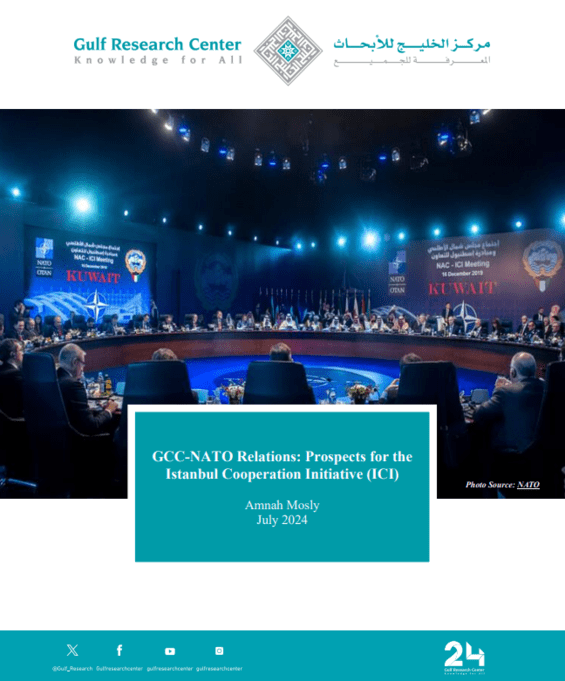Select any text and click on the icon to listen! ByGSpeech
ByGSpeech
 ByGSpeech
ByGSpeech ByGSpeech
ByGSpeech
Introduction
June 2024 marks the 20th anniversary of the Istanbul Cooperation Initiative (ICI) of the North Atlantic Treaty Organization (NATO). Given its two-decade existence, it is necessary to reflect on ICI’s significance and impact, particularly as geopolitical tensions in the Middle East continue to rise and as the GCC states seek new security arrangements in light of a shifting order that threatens their security.1 As competition in the region has intensified, the GCC states have established themselves as relevant political and economic power brokers, both regionally and internationally.
The GCC countries are directly impacted and, as such, are involved in many regional conflict situations, including in Syria, Sudan, and Yemen. Moreover, they stand front and center of efforts to de-escalate tensions, including with Iran and in regard to the Palestinian issue. These mediation and bridge-building efforts even extend to Ukraine and Russia, where prisoner exchanges have resulted from Arab Gulf involvement.
As the GCC states continue to seek to enhance their defense capabilities and address regional security challenges, and as NATO continues to adapt to evolving security threats, the idea of continued and even enhanced cooperation and partnership between them continues to garner attention.
To be sure, the availability and use of alliance formats are still required to resolve many conflict situations in the Middle East and beyond despite the GCC’s de-escalation efforts. While the ICI could serve as such a mechanism, it has yet to establish itself as a permanent feature of a new regional security order in its current format. As it stands, the ICI requires a more explicit strategy on how to deliver more comprehensive security and diplomacy to the GCC states. This paper will analyze the Istanbul Cooperation Initiative, its evolution over the past two decades, its achievements, shortcomings, challenges, and future prospects. The paper will explain that the expansion into GCC-NATO cooperation will be only natural due to mutual interests between the two sides and the urgency for Gulf security given the rapidly changing security environment in the region.
Establishment and Objectives of the Istanbul Cooperation Initiative
The Istanbul Cooperation Initiative (ICI) is a NATO initiative launched in June 2004 at the NATO Summit in Istanbul to foster dialogue, political consultation, and practical cooperation on various security-related issues with member states of the Gulf Cooperation Council. The Initiative addresses common security challenges, such as counterterrorism, energy, maritime, and nuclear security. Furthermore, the ICI aims to enhance interoperability between NATO and its Gulf partners, contributing to the region’s overall security architecture.
The Initiative was launched one year after the United States’ invasion of Iraq in 2003, which had numerous consequences on regional stability. At the “NATO’s Role in Gulf Security” conference held in Qatar in 2005, then NATO Secretary General H.E. Jaap de Hoop Scheffer emphasized three reasons that motivated NATO to launch the ICI: the changing security environment (security challenges such as terrorism, weapons of mass destruction, human trafficking, weapons, and drugs, that cannot be addressed individually), the changing nature of NATO itself (i.e. NATO’s transition from deterring a major war in Europe throughout the Cold War from tackling new threats and challenges, and the new dynamic in the Gulf region with the region positioning itself as the center for regional conflict situation rather than the more traditional Arab-Israeli conflict (NATO, December 2005). The Secretary-General’s visit was the first by a senior NATO official to any of the GCC states in the organization’s history.
The Istanbul Summit Communique of June 28, 2004, stressed that the NATO initiative is a “cooperative initiative, based on joint ownership and the mutual interests of NATO and the countries of the region, taking into account their diversity and specific needs” and is intended to complement other regional or international initiatives such as the European Union (EU), the Organization for Security and Cooperation in Europe (OSCE), and NATO’s own Mediterranean Dialogue (MD) which includes seven countries on and around the southern rim of the Mediterranean (NATO, June 2004; Webb, December 2019).
The document explicitly states, “the need to avoid misunderstandings about the scope of the initiative, which is not meant to either lead to NATO/EAPC/PfP membership, provide security guarantees, or be used to create a political debate over issues more appropriately handled in other fora” (NATO, June 2004). Instead, NATO allied leaders stated in the communique that “this initiative is offered by NATO to interested countries in the region, starting with the countries of the Gulf Cooperation Council, to foster mutually beneficial bilateral relationships and thus enhance security and stability.” The document specified that the ICI “will be developed in a spirit of joint ownership with the countries involved. Continued consultation and active engagement will be essential to their success.”
[PIC]
From a NATO perspective, the ICI is based on a foundation of six fundamental principles:
Following the 2004 Summit, Bahrain, Kuwait, and Qatar formally joined the ICI in the first three months of 2005, followed by the United Arab Emirates in June. Oman and Saudi Arabia have to date not joined the Initiative although both countries do have participated in selected ICI-related activities. Many analysts attribute this to the fact that, until recently, NATO did not necessarily have a positive image in the region, and some of its actions were seen as controversial. Previously, as numerous researchers and analysts point out, NATO’s intervention in the Gulf was tied to the US, and its image has been adversely affected by the policies of the US administrations, particularly policies by the Bush administration in the region until 2008 (Razoux, January 2010).